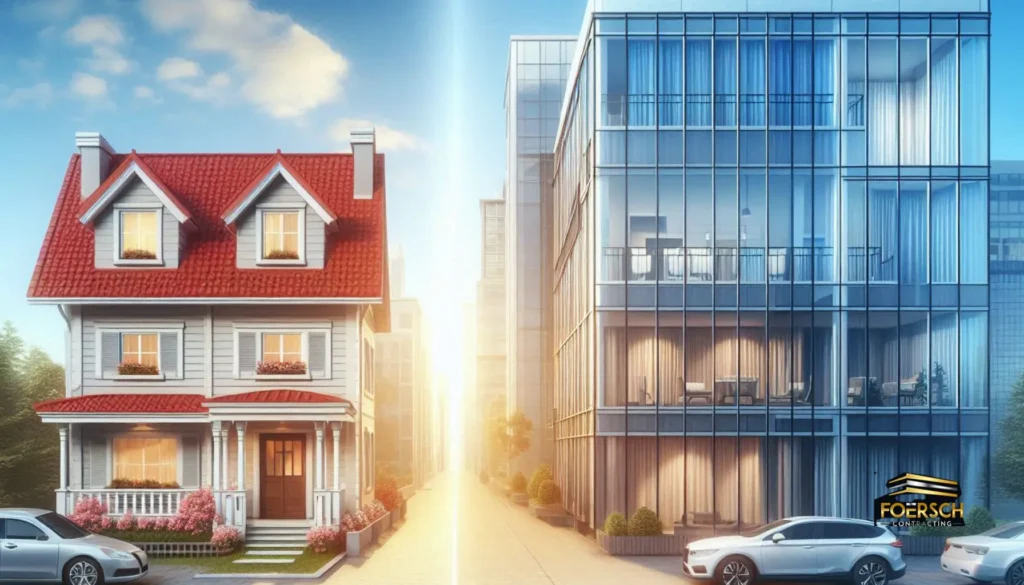Commercial and Residential Contracting Services in the construction industry are broad and diverse, consisting of two main segments, each with distinct roles. Anybody involved in a building project, whether contractors, property owners, or companies planning to develop new properties. It needs to understand the essential contrasts between these two industries. This thorough guide examines the differences between commercial and residential contracting services and offers insightful advice on selecting the best services for your project.
Introduction to Residential Contracting Services
Residential contracting mainly emphasizes building and remodeling residential properties like single-family homes, townhouses, and small apartment buildings. These are usually private endeavors tailored to individuals’ or families’ unique requirements and preferences. Their scope ranges from modest renovations to the construction of whole new residences.
Essential Features in Residential Construction Services:
- Scale and Complexity: Unlike commercial projects, residential projects are usually smaller and less complicated, making them easier to manage and finish sooner.
- Regulatory Requirements: These projects often face fewer regulatory obstacles, with the significant requirements being adherence to local construction codes and safety standards.
The aim is to design livable environments that are safe and secure and suit the homeowner’s demands and lifestyle preferences.
Exploring Commercial Contracting Services
Commercial contracting includes large-scale construction projects such as office towers, retail centers, hospitals, schools, and industrial facilities. These projects are intended to meet functional business needs, improve economic viability, and satisfy public or organizational usage requirements.
The critical characteristics of commercial contracts are as follows:
- Scale: Commercial projects typically involve significant financial investments and careful strategic planning.
- Complexity: These projects require advanced project management skills and require coordination among numerous stakeholders, including architects, city planners, and construction teams
- Regulatory Compliance: Commercial constructions are subject to many laws, rules, and industry codes that guarantee public safety and functionality.
Differences in Commercial and Residential Contracting Services
Several key differences are apparent when comparing Residential and Commercial contracts. Moreover, Each affects the approach and management of construction projects.
Scale and Project Scope
The size and scope of the initiatives are where the differences are most noticeable. Residential contracting frequently serves single families or small community developments and is more targeted and specialized. However, These projects typically involve building new homes or renovating existing ones to suit the needs. It tastes off residents and is usually more straightforward. Commercial contracting, on the other hand, works on far bigger projects. Moreover, These include creating office buildings, shopping centers, lodging facilities, and educational institutions. These are built to meet practical business needs, produce economic benefits, and handle increased public traffic.
Regulatory Requirements
Another notable distinction is the degree of regulatory scrutiny and compliance complexity associated with each type of project. Residential projects usually follow local building norms and safety regulations, navigating simpler regulatory environments. These regulations are often less severe, with a significant focus on assuring the safety and livability of the dwelling. Conversely, commercial projects are subject to stricter laws that govern everything from construction safety to environmental effects and public accessibility. Moreover, A greater variety of codes and standards must be followed when building a commercial structure, frequently involving several regulatory agencies. Because of their intricacy, compliance at every level of construction requires a more profound comprehension and careful planning.
Stakeholder Engagement in Commercial and Residential Contracting Services
There are also notable differences in the quantity and variety of stakeholders between the two categories of services. Generally speaking, residential contracting services entail direct communication between the contractor and the homeowner, with sporadic contacts with architects and local government agencies. Decisions are typically made more straightforwardly and intimately, emphasizing meeting deadlines and ensuring everyone is satisfied. On the other hand, a wide range of parties are involved in commercial contracting, such as investors, business owners, architects, local government representatives, and occasionally even public members. The expectations and needs of each stakeholder may differ, which adds complexity to the administration of commercial initiatives. Because of this, contractors from Foersch Contractors are very skilled in stakeholder management, negotiation, and communication to coordinate and meet the various goals of all parties.
These distinctions significantly impact project conception, planning, and implementation. Furthermore, they emphasize the necessity of specific knowledge and methods based on the project type—residential versus commercial. Contractors must comprehend these differences to customize their services appropriately, and clients must select the best contractor for their requirements.
Commercial & Residential Contracting Service: How to Choose the Right One
Whether you are building a home or a business, choosing the exemplary contracting service is an important choice that will significantly impact how well your project turns out. The following comprehensive procedures and factors will help you select the best contractor for your requirements:
1. Determine Specific Project Needs
First, clearly define the scope of your project. Based on the nature of your project, understand whether you need residential or commercial contracting services. For residential projects, consider aspects such as the size of the home, specific renovations required, and any unique features you wish to include. On the other hand, For commercial projects, think about the scale of the build, the type of business it will support, and any special requirements such as high-tech facilities or specific regulatory compliance needs.
2. Expertise and Experience
Select a contractor with the right expertise and a proven track record in your project type. For residential projects, look for contractors with a robust home portfolio matching your desired style and quality. For commercial projects, choose contractors with experience in the specific type of commercial build you are planning, whether it’s a retail space, an educational institution, or an industrial facility. Review their past projects, and don’t hesitate to visit ongoing projects to see firsthand how they manage their construction sites.
3. Licensing, Certification, and Insurance
Ensure that any contractor you consider is appropriately licensed and insured according to state and local regulations. Moreover, This is crucial for residential and commercial projects to protect you against liability and ensure that the contractor meets industry standards. Check their certification statuses, such as specific credentials in environmental safety, ADA compliance for commercial contractors, or specialized residential construction certifications.
4. Compliance and Regulatory Knowledge
Your contractor should have comprehensive knowledge of the regulations and codes relevant to your project. This includes understanding zoning laws, environmental regulations, and building codes at a granular level for commercial projects. For residential projects, the contractor should be familiar with local building codes and homeowner association guidelines, if applicable. Ask potential contractors how they ensure compliance and handle permitting and inspections.
5. References and Reviews
Request references and contact them to inquire about their experiences with the contractor. For residential projects, speak with previous clients to learn about their satisfaction with the project’s outcome and the contractor’s communication throughout the process. For commercial projects, seek feedback from past business clients on how the contractor handled the complexities of their projects, including meeting deadlines and budgeting.
6. Communication Skills
Effective communication is essential for the success of any project. The contractor should be approachable, responsive, and transparent in their dealings. They should be willing to engage in regular updates and proactively address concerns. Discuss how they plan to communicate during the project and ensure their style matches your expectations.
7. Project Management Abilities
Strong project management is critical, especially for commercial projects involving complex resource coordination, timelines, and stakeholders. Assess the contractor’s ability to manage projects by discussing their project management processes, tools, and team dynamics. Understanding their approach to project scheduling, subcontractor management, and on-site supervision is essential for residential contractors’ services.
Conclusion
Making educated judgments in the construction sector requires understanding the distinctive features of residential and commercial contracting services. You can ensure that your construction project, whether commercial or residential, is successful by selecting the correct contractor, matching your needs with the project’s requirements, and guaranteeing compliance and quality. With this understanding, businesses and property owners can confidently traverse the complex world of construction and produce results that are feasible and perfectly aligned with their strategic objectives.
FAQs
1. How is residential contracting different from business contracting?
Residential contracting is usually done on a smaller scale, emphasizing residences and the satisfaction of individual homeowner demands. Commercial contracting includes larger teams, more stringent standards, and business-related structures.
2. How can I find a trustworthy home builder?
Verify their licensing, get references, and review their portfolio to ensure they meet your project’s requirements and have a history of producing high-caliber work on schedule.
3. What standards should I follow while selecting a commercial contractor?
Examine their prior expertise with related projects, aptitude for navigating intricate legal requirements, and capacity for efficient project management. Make sure they follow industry standards and are financially stable.
4. For contractors, which certificates are necessary?
Residential contractors should hold certifications in home building and safety. For commercial projects, seek credentials in advanced project management, compliance, and particular technical abilities pertinent to your project type.












